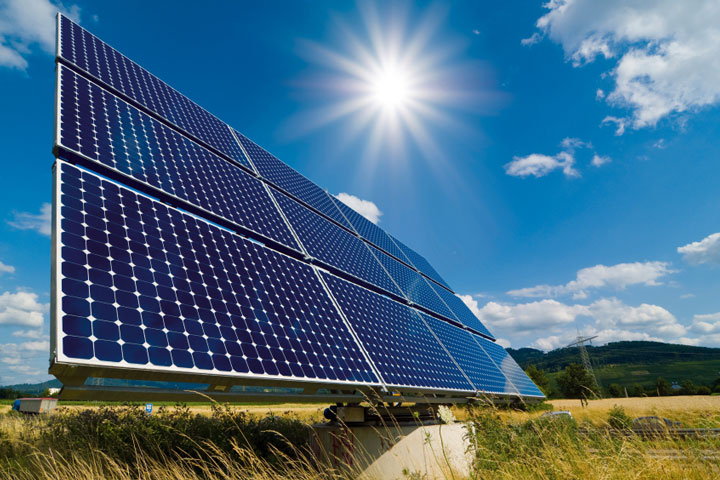Business
That N10bn Solar Energy Proposal
Published
7 years agoon

- That N10bn Solar Energy Proposal
The Federal Government’s N10bn proposal for the electrification of 37 federal universities and seven university teaching hospitals across the country came under intense criticism at the meeting of the Senate Committee on Power, Steel Development and Metallurgy on Thursday, December 14, 2017. And rightly so.
At the budget hearing, the Managing Director, Rural Electrification Agency, stated that N10bn had been earmarked for the project, “Rural Electrification Access Programme in Federal Universities.” While the news media indicated that the Senator Enyinnaya Abaribe-led committee was deeply concerned at the insensitive preference of streetlight for universities, amidst several other priority needs begging for government’s attention, the Ministry of Power, Works and Housing has since come out with a clarification stating that the budgeted N10bn is for a “Rural Electrification Access Programme in Federal Universities” that is expected to “rejuvenate the education system.”
I will suggest that the concern by the Chairman of the Senate Committee on Power and his colleagues holds great validity, for the following reasons –
First, A review of “Part IX – Rural Electrification” of the Electric Power Sector Reform Act, 2005 leaves no ambiguity as to its focus on providing electricity to rural dwellers. Indeed, a review of any definition of the word, “rural”, would indicate a consistency of such areas as being located outside of towns and cities. Thus, the question arises, since when did universities and hospitals, typically located in the heart of cosmopolitan and urban centres, qualify to be considered under the Rural Electrification Agency’s mandate?
Second, with an estimated 55 per cent of urban areas currently electrified versus 35 per cent electrification of rural areas, should the N10bn not be put into the Rural Electrification Fund that is specified under Section 88.12 of the EPSRA to facilitate investment in the electrification of these areas that are typically not commercially viable, due to demographic sparseness and lack of affordability? If we are to address the issues that typically bedevil our rural areas – lack of job creation, poor quality of life, fire, health and environmental challenges from the use of wood burning and kerosene lighting up rural homes, etc., surely, funding the electrification of rural Nigeria holds greater value for the use of this money. The use of the N10bn will go a long way to meeting the following objectives of the Rural Electrification Fund – a) Achieving equitable regional access to electricity; b) Expanding the grid and developing off-grid electrification; c) Providing subsidies for consumption that will stimulate innovative approaches to rural electrification, etc.
Third, implementation of the delivery of solar-powered energy to the universities and hospitals, comparatively, is not cheap. On the average, wholesale price of solar energy is N39.9/kWh versus N16.9/kWh for on-grid electricity. This fact is even more important when we take into consideration the fact that some of these institutions receive close to 24 hours of electricity supply, as premium customers, in most of the electricity distribution franchise areas where they are located. In plain terms, why should the Nigerian taxpayers be saddled with purchasing a product for over two times the cost of what is readily available to these institutions?
If anything, this N10bn solar power proposal by the power ministry seems to be another in the increasingly inexorable march by the Federal Government back into state-ownership of generation assets (on the back of the General Electric fast power project that is being funded by the Federal Government), contrary to the privatisation objectives of the National Electric Power Policy, 2001 and EPSRA. The policy and the law resulted from a recognition that the government, due to decades of inefficiency, wastage of taxpayer funds and corruption, in operating the state-owned electric utility company, Nigerian Electricity Power Authority, has no business operating in a sector that should be private sector-driven. Unfortunately, here we go again.
Fourth, one is not sure how the expenditure of the proposed N10bn equates to the rejuvenation of the educational system, as stated by the MPWH. I agree that such rejuvenation is critically needed in a nation that has seen a dramatic decline in the quality of the education that its citizens used to enjoy. I would suggest, however, that greater impact for such rejuvenation could be best achieved by investing in paying teachers better salaries, providing academic supplies, re-establishing higher standards of academic excellence, rehabilitating physical infrastructure, etc. – these are the mandate of the Ministry of Education. Additionally, if the objective of the N10bn initiative is to “rejuvenate the education system,” does the MPWH also plan to subsidise private institutions, for equity and for the achievement of comprehensive results?
Unfortunately, this proposal comes at a time when the power sector is facing critical and strangulating financial challenges to building the capacity for the sustainable electricity supply that will drive the growth of our economy. The liquidity constraint means that the electricity value chain continues to be deprived of the funding needed to inject the efficiency that is desperately needed in the sector. As a matter of fact, the Nigerian Electricity Supply Industry is burdened with a market shortfall that may eventually collapse the sector, without reasonable government intervention.
In view of this, I suggest that the N10bn can be better and efficiently utilised by the government in expanding the national grid, by building up the capacity of the Transmission Company of Nigeria, a wholly government-owned company, to wheel energy sustainably and reliably, given its history of being consistently underfunded and its critical role in the value chain. Alternatively, the money could be applied to subsidising the consumption of the lifeline electricity consumers, who struggle with electricity affordability issues, as seed money for the Consumer Power Assistance Fund, which still has not been set up, as a fundamental requirement of the EPSRA. The REA, going outside of its mandate, endangers the hopes of rural dwellers for electricity that will improve their lives and creates opportunity for wastage of funds that are desperately needed for priority projects in the sector. In this era of “Change” as a mantra or common refrain, we must move away from politicised and ill-thought-out policies to that which holds the greatest good for greatest number of our citizens.
Thus, it is easy to understand why the Senate Committee on Power, like many Nigerians and major stakeholders in the sector, cannot understand why the REA wants to spend a huge amount of money to provide solar power in universities and hospitals when rural communities that require electrification, for which the agency was created, are left in darkness – whether its proposed N10bn initiative is for street lighting or rejuvenating the educational system.
Is the CEO and Founder of Investors King Limited. He is a seasoned foreign exchange research analyst and a published author on Yahoo Finance, Business Insider, Nasdaq, Entrepreneur.com, Investorplace, and other prominent platforms. With over two decades of experience in global financial markets, Olukoya is well-recognized in the industry.

You may like
-
Nigeria Surpasses OPEC Quota with 1.51 Million bpd, Targets 2.06 Million in 2025
-
Global Investors Commit $7.6 Billion to Nigeria’s Development at AIF 2024
-
Nigeria-China Trade Strengthened as Grimaldi Introduces Direct Shipping Line
-
Nigeria’s GDP Records 3.46% Growth in Q3 Spurred by Non-Oil Sector
-
President Tinubu Presents N47.9trn 2025 Budget As Debt Servicing, Security, Infrastructure Take Lion Shares
-
I’m Not Nigeria’s PR, UK Party Leader, Kemi Badenoch, Tells Shettima













